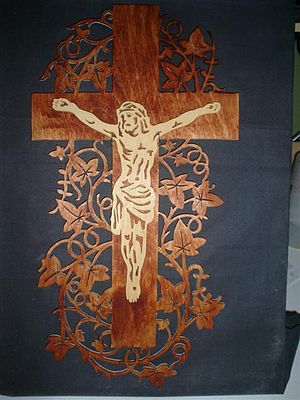Jesus (peace be upon him) represents a common link between the two religions having the most followers on the earth today, Christianity and Islam.
Christians believe that Jesus (pbuh) is God, came to the earth in human form to die for the sins of the world.
Islam teaches that Jesus (pbuh) was a prophet sent to the children of Israel and he was neither crucified nor killed. In fact he is alive and is with the God and will come back to earth before last days.
The Noble Quran :
An-Nisa [Chapter 4 : 71]
O people of the Scripture (Christians)! Do not exceed the limits in your religion, nor say of Allah aught but the truth. The Messiah, Jesus, son of Mary, was only a Messenger of Allah and His Word, (“Be!” – and he was) which He bestowed on Mary and a spirit created by Him; so believe in Allah and His Messengers. Say not: “Three (trinity)!” Cease! (it is) better for you. For Allah is (the only) One Ilah (God), glory be to Him (Far Exalted is He) above having a son. To Him belongs all that is in the heavens and all that is in the earth. And Allah is All-Sufficient as a Disposer of affairs.
Al-Imran [Chapter 3 :54]
And they (disbelievers) plotted to kill ‘Isa (Jesus), and Allah plotted too. And Allah is the Best of those who plot.
An-Nisa [Chapter 4 : 157]
That they(Jews) said (in boast), “We killed Christ Jesus the son of Mary, the Messenger of Allah.;- but THEY KILLED HIM NOT, NOR CRUCIFIED HIM, but so it was made to appear to them, and those who differ therein are full of doubts, with no (certain) knowledge, but only conjecture to follow, for of a surety they killed him not.
Christians believe that Jesus (pbuh) was suffered on cross and sacrificed his life for sinful humans. But when I examined the Bible I found something different.
I heard some of my friends saying that, ‘No one dies for us, not even our parents. But Jesus loves us and he died for our sins’. But when I read the Bible, I found something different.
Did Jesus want to be crucified or die in the hands of disbelievers? Bible says NO!!
Please read the following :

Matthew 26:39
Going a little farther, he fell with his face to the ground and prayed, “My Father, if it is possible, may this cup be taken from me. Yet not as I will, but as you will.”
Matthew 26:42
He went away a second time and prayed, “My Father, if it is not possible for this cup to be taken away unless I drink it, may your will be done.”
Mark 14:36
“Abba, Father,” he said, “everything is possible for you. Take this cup from me. Yet not what I will, but what you will.”
Luke 22:42
“Father, if you are willing, take this cup from me; yet not my will, but yours be done.”
If the mighty messenger prays like that, doesn’t God answer his prayers??
Jesus (pbuh) prayed God to protect him. He prayed in this way – ‘my will is you protect me from disbelievers and if your will is to let me die in their hands, your will only should be done.’
According to Christians, he was crucified. That means whatever Jesus prayed, God didn’t accept his prayer and let Jesus die on cross. I ask one question – If prayer of mighty messenger like Jesus was not accepted by God, then what about prayers of normal people like us?
There is one more verse in Hebrews (5:7) in which Paul says the prayers of Jesus to the God, were answered to save him from death:
[Hebrews 5:7]
During the days of Jesus’ life on earth, he offered up prayers and petitions with fervent cries and tears to the one who could save him from death, and he was heard because of his reverent submission.
Prophets prayers were answered. Abraham (pbuh), in his old-age had prayed for a son, and Ishmael (pbuh) was born. Ishmael literally means “GOD HEARD”, in Hebrew. Zakariah (pbuh) also in his old-age prayed for a son, and God heard (accepted) his prayers, and John the Baptist was born. Bible says Jesus(pbuh) cried for help, and God heard (accepted) his prayers:
“And there appeared an angel unto him from heaven, strengthening him.” (Luke 22:43)
Strengthening him in the faith means assuring him of divine favor that God would save him.
If you still can not believe this, please look at the following verses in Bible:
Matthew 27:46
About the ninth hour Jesus cried out in a loud voice, “Eloi, Eloi, lama sabachthani?”—which means, “My God, my God, why have you forsaken me?”
Mark 15:34
And at the ninth hour Jesus cried out in a loud voice, “Eloi, Eloi, lama sabachthani?”—which means, “My God, my God, why have you forsaken me?”
A person who prayed God like this (“I want you to protect me, if you do not will to protect me, your will only should be done, not my will”), Can say these words later – “My God, Why have you forsaken me?”
Please think about it!! Can you imagine a noble messenger like Jesus praying to God, by changing the words like this???
I heard some people saying, ‘may be Jesus didn’t want to sacrifice his life, but God willed him to do that’. If this is the case, I know few Christian brothers & sisters who are so passionate about the sacrifice of Jesus for human sins. They say ‘who will die for us? Even our parents can not die for us. But Jesus died for us with love’. From above verses of the Bible, do you still say that Jesus wanted to die for you with love? It is crystal clear that Bible says he didn’t want to die and prayed God to protect him.
Some may say that God took the human form and that weak human was terrified, cried and prayed. Here two questions get raised :
1. If Jesus was God, and then who was he praying to? Does God pray to himself?
2. If God in human form was terrified, cried and want to escape the death, what about a normal solider of our days who gets ready to sacrifice his life for his country and participates in war? Do you say that soldier is courageous than Jesus ?
If you still can’t believe about his prayer – Please look at these verses:
Luke 22:36
He said to them, “But now if you have a purse, take it, and also a bag; and if you don’t have a sword, sell your cloak and buy one.
Why did he tell his disciples to buy swords at that time? He said ‘if you don’t have the sword, sell your cloak and buy one’. What was the need for sword at that time? Was it not for protection from disbelievers if they try to catch him for killing? The scene in the Garden says so. Prayer of Jesus in the garden, and ordering his disciples to buy swords supports that Jesus and his disciples wanted to protect themselves.
The disciples were already armed. They had not left Galilee with bare knuckles. They responded:
“. . . Lord, behold, here are two SWORDS.” And he said unto them, “It is enough”. (Luke 22:38)
If you are still in doubt about it, please see the verses below:
Some may say that the SWORDS were spiritual! If the swords were spiritual, then the “garments” must also be spiritual. If the disciples of Jesus were to sell their SPIRITUAL garments to buy SPIRITUAL swords, one does not lop off people’s physical ears with spiritual swords —
Matthew 26:51
“And, behold, one of those who were with Jesus stretched out his hand, and drew his SWORD, and struck a servant of the high priests, and cut off his ear.“
The only purpose of swords or guns is to maim and to kill.
Now please look at the Prayer of Jesus (pbuh) in Gospels, it rules out the crucifixion :
John 17 : 3-4
Now this is eternal life that they know you, the only true God, and Jesus Christ, whom you
sent. I glorified you on earth by completing the work you gave me to do.
What did Jesus say here?
He said – ‘you, the only true God’. These are explicit words of Jesus that he is not the God but the God who sent Jesus is the only true God.
Coming to our topic,
Jesus said – ‘I completed the work you gave me’.
Work is completed!!!!??
The work God gave to Jesus is completed??!!!
According to the Christian doctrine, Jesus was sent to die for the sins of the world. But look at the gospel here, crucifixion is not yet over, but Jesus was saying that ‘work is completed’!!!!
Friends, this is the matter of salvation. It should be taken very seriously. If you still stick to the thought that Jesus (pbuh) loved to die for the sins of the world, Please do think again, even Bible doesn’t support it.!!!!!!!!!
This is not to hurt anyone’s feelings. I have very good Christian friends and some of them are converted Christians. They are very nice, kind and generous. I want to present what I found in the Bible to my friends & other Christian brothers & sisters. In fact, it is the matter of salvation, and we are given only one life on this earth, there would be no second chance. I wish everyone should try to know the truth about God before death approaches and be saved on Day of Judgment by grace of God Almighty. This is not to criticize or hurt anyone’s feelings and beliefs. I only want to present the truth, what I found. I hope my friends understand my concern for their hereafter and look into this article and analyze the truth for the sake of God Almighty.










